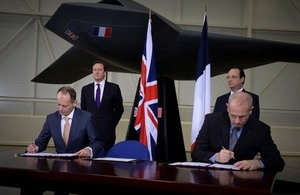£15 million investment seals UK/ France space collaboration
New agreement will see more joint working, including £15 million investment identified for instruments for weather satellites and a UK contribution to a global survey of Earth’s fresh water.

Dr David Parker, CEO of UK Space Agency and Jean-Yves Le Gall, President of CNES sign agreement on closer relationship on space projects overseen by Prime Minister David Cameron and French Presendent Hollande.
The UK Space Agency and the Centre National d’Etudes Spatiales (CNES) have today (31 January 2014) agreed a deal to work even closer together on space activities. The agreement includes £15 million of UK investment in key instruments for the next generation of European weather satellites and will enable UK scientists to conduct the most comprehensive global survey of Earth’s surface water.
The agreement paved the way for joint work on Earth observation, telecommunications, space weather and research and technologies in the space field, and was witnessed by the Prime Minister and President Hollande at the UK-France Summit at RAF Brize Norton in Oxfordshire.
Speaking in the Summit plenary at Brize Norton, Minister for Universities and Science, David Willetts said:
“Today is a major milestone in the future of British and French collaboration in space. This initial investment of £15 million will develop two major areas of Earth observation technology. These projects will have huge scientific and economic benefits, providing detailed weather forecasting and water management across the world.
“Collaboration in telecommunications, space weather, greenhouse gas monitoring and space technology will strengthen the links between our countries. Space is one of the eight great technologies and our cooperation will shape the future of European space projects, keeping us at the front of the pack in the global race.”
Dr David Parker, Chief Executive of the UK Space Agency, and Jean-Yves Le Gall, President of the Centre National d’Études Spatiales (CNES) signed the agreement which recognises the role of space infrastructure in providing the services of the future. The UK Space Agency and CNES have already identified projects where working together will be mutually beneficial, including telecommunications, navigation and weather forecasting.
Dr David Parker, Chief Executive of the UK Space Agency, said:
“Space is a growing global business, with a growing importance to the world economy. To build on our country’s success in the global space market, make the most of the sector’s many benefits and to meet increasingly international challenges, we need to build strong relationships with other space-faring nations.
“Renewed collaboration between the UK Space Agency and CNES will help us meet common goals and find new opportunities for our scientific and industrial partners in the space sector.”
The UK Space Agency-CNES agreement will strengthen the long-term relationship between the two agencies and build their contribution to space activities carried out through the European Space Agency (ESA), the European Union (EU) and other international organisations.
The framework agreement will facilitate:
- conception and development of joint space missions;
- joint research projects;
- joint development of hardware and software;
- exchange of data, information and personnel;
- joint organisation of workshops, symposia, practical courses and presentations.
Projects for immediate collaboration include an instrument for EUMETSAT - the next generation of European weather satellites, and the CNES/NASA project on global fresh water distribution.
Infrared Atmospheric Sounding Interferometer (IASI) for EUMETSAT
The UK will make an industrial contribution to the French IASI instrument for EUMETSAT - the next generation of European weather satellites. This Franco-British collaboration will help increase forecasting accuracy and enhance the value of weather forecasting services to society and business.
SWOT satellite mission to conduct survey of Earth’s surface water
Following the signature of the new framework agreement, the UK will gain involvement in a CNES/NASA project on global fresh water distribution. The mission will conduct the most comprehensive global survey of Earth’s surface water ever, using the Surface Water and Ocean Topography (SWOT) satellite. SWOT will measure how water bodies on Earth change over time, helping us improve ocean circulation models, weather and climate predictions, and freshwater management around the world.